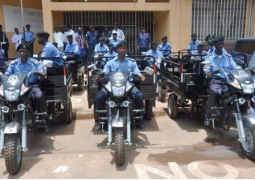The Economic Community of West African States (ECOWAS) yesterday concluded a two day sub-regional workshop on the protocol to fight against corruption in
Speaking on the occasion the adviser for Democracy and Good Governance to the President of the ECOWAS Commission, Professor Ade Adefuge, said a corruption-free society is an ideal hope to attain, essentially because of the negative impacts corruption has had, and will continue to have, as an impediment to our effort to create a West African society that we all dream of.
According to Prof. Ade Adefuge, corruption often has had a negative impact on equitable development.
"Corruption often has negative impact on equitable development.
It has led to the diversion of funds which could have been used for development. Thus nations especially in the developing world, suffer in areas of education, health care and infrastructure development. It affects the choices made by those in authority," he said.
Prof. Ade noted that it is the reason why government officials will prefer the building of station and importation of health military equipment to provision of education and health care. "In the developing world, especially in those confronted by mass poverty and very high level of unemployment, corruption has deeply corrosive effects on trusts in government and contributes to crime and political disorder," said Prof. Adefuge.
For the ECOWAS adviser, corruption undermines democracy and good governance.
Deputizing for the Attorney General and Secretary of State for Justice, Dr. Henry Carrol, Solicitor General and Legal Secretary, said the concepts of good governance, democracy consolidation, respect for rule of law, protection of human rights and economic growth, cannot be sustained without reliable institutions.
According to Dr Carrol, corruption is any abuse of office, position and entrusted powers for private gain, which includes bribery, fraud, diversion and related offences.
For Dr. Henry Carrol, democracy peace, political stability and social justice cannot succeed outside the rule of law which involves legislations conforming to human rights, freedom of information and communication, a judicial system, a good public administration as well as proper management of state apparatus.
For her part, the Resident Representative of UNDP, Ms Chinwe Dike, commended ECOWAS for bringing together practitioners, academics and activists working in various anti-corruption institutions in this sub region to critically discuss topics concerning the fight against corruption in
"The principle of good governance may mean different things to different institutions and practitioners," she said.
The workshop was sponsored by the UNDP in collaboration with ECOWAS and brought together participants from across the sub region.


